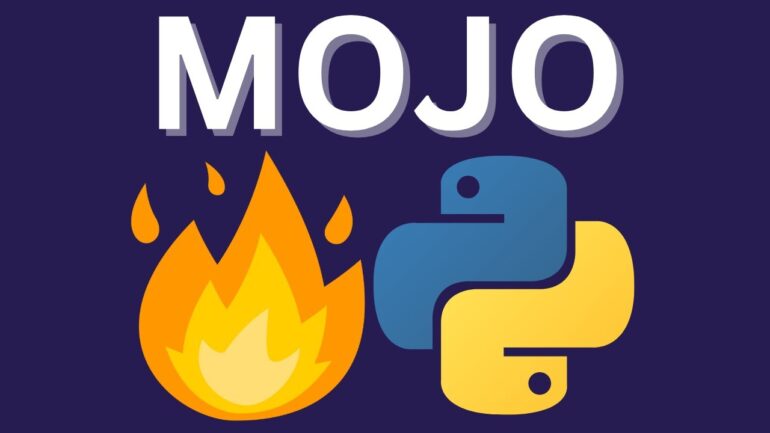TL;DR:
- Mojo, a new programming language for AI developers, combines the usability of Python and the performance of C.
- It enables direct access to AI computing hardware, making it ideal for AI-based inventions.
- Mojo seamlessly integrates with the Python ecosystem and supports other languages like C++ and CUDA for production environments.
- The language enhances program execution speed and developer productivity through modern compilation technology.
- Mojo’s type design optimizes memory allocation, while zero-cost abstractions allow for expressive code without compromising efficiency.
- It ensures memory safety and offers autotuning and compile-time metaprogramming capabilities for further optimization.
- Mojo outperforms Python, being up to 35,000 times faster for certain algorithms, and aims to become a superset of Python in the future.
Main AI News:
The domain of Artificial Intelligence is undergoing an incredible boom, with AI and ML technologies evolving rapidly. Today, every organization seeks to integrate AI into its products, harnessing its applications for unmatched usability. A trailblazing startup, Modular AI, has recently unveiled a groundbreaking programming language known as Mojo. This language is engineered to revolutionize the AI landscape, offering direct access to Artificial Intelligence computing hardware and ushering in a new era of AI-based innovations.
Mojo stands out by combining the best of both Python and C languages. Leveraging Python’s ease of use and C’s raw performance, this cutting-edge language addresses the limitations of Python, especially its lack of scalability. Unlike Python, which struggles with large workloads and edge devices, Mojo steps in to fill the void, enabling seamless AI implementation in the production environment. Moreover, Mojo seamlessly integrates with the Python ecosystem, allowing effortless incorporation of essential libraries like Numpy and Matplotlib, as well as custom code, for a truly flexible development experience.
The language’s true prowess lies in its ability to harness the full potential of hardware capabilities, including multiple cores, vector units, and specialized accelerator units. This feat is achieved through an advanced compiler and heterogeneous Runtime, ensuring optimal performance with unparalleled ease. Surprisingly, Mojo empowers Python developers to create high-performance applications without requiring proficiency in languages like C++ or CUDA, simplifying the AI development process without compromising efficiency.
Under the hood, Mojo boasts modern compilation technology, significantly boosting program execution speed and developer productivity. One of its key features is its advanced type design, enabling the compiler to make intelligent decisions regarding memory allocation and data representation. This, in turn, leads to exponential gains in execution performance, propelling Mojo to new heights of efficiency. Moreover, developers can revel in zero-cost abstractions, which allow the creation of expressive and readable code while maintaining the efficiency of low-level operations.
In addition to its remarkable performance, Mojo ensures memory safety, effectively preventing common memory-related errors such as buffer overflows and dangling pointers. This unwavering commitment to security ensures that developers can focus on innovation without worrying about vulnerabilities. Mojo also offers sophisticated capabilities in autotuning and compile-time metaprogramming, allowing for further optimization and flexibility. Autotuning optimizes program performance during compilation, while compile-time metaprogramming empowers programs to adapt their structure and behavior based on specific compile-time conditions, resulting in more efficient code generation.
Compared to Python, Mojo’s computing performance is simply unmatched, thanks to its direct access to AI computing hardware. It boasts a staggering 35,000-fold increase in speed when executing complex algorithms like Mandelbrot. This outstanding achievement is facilitated by Modular’s high-performance Runtime and its mastery of Multi-Level Intermediate Representation technology, enabling seamless interaction with low-level hardware functions, such as threads, TensorCores, and AMX extensions. In fact, Mojo aims to become the epitome of AI programming by evolving into a strict superset of Python, promising even greater capabilities in the future.
Conclusion:
The introduction of Mojo into the AI market brings significant advantages for developers and organizations alike. Its fusion of Python’s user-friendliness and C’s performance opens up new possibilities for creating AI-powered solutions. With direct access to AI computing hardware and seamless integration with Python, Mojo streamlines development processes and enables organizations to deploy AI innovations more efficiently. The language’s focus on optimization and memory safety ensures reliability and empowers developers to create high-performance applications. As Mojo continues to evolve, it is poised to become a dominant force in the AI development landscape, driving the market toward greater efficiency and innovation. Businesses that adopt Mojo early on can gain a competitive edge by leveraging its unique capabilities to stay at the forefront of AI technology.

